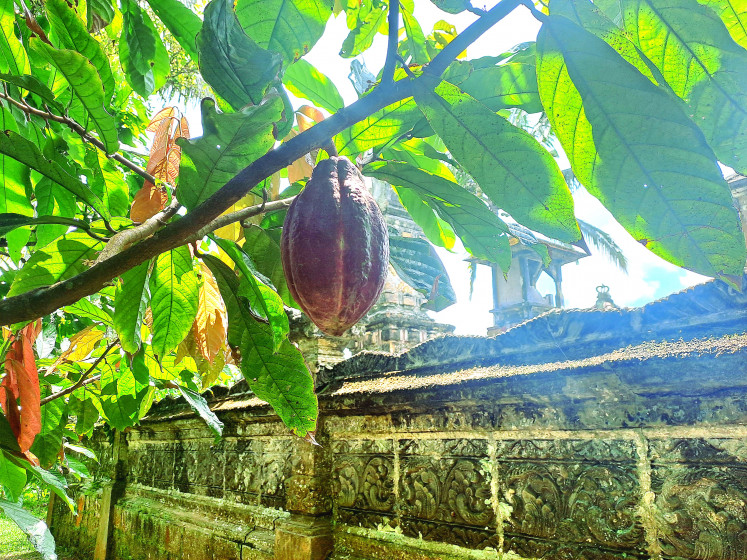Popular Reads
Top Results
Can't find what you're looking for?
View all search resultsPopular Reads
Top Results
Can't find what you're looking for?
View all search resultsAmid fast fashion, tailoring services still thrive
At your service: Fabrics are displayed at Laxmi Tailors in Pecenongan, Central Jakarta
Change text size
Gift Premium Articles
to Anyone
At your service: Fabrics are displayed at Laxmi Tailors in Pecenongan, Central Jakarta. (Courtesy of Laxmi Tailors)
In the past, every family needed a tailor because all the clothes of the members had to be made at a tailor shop. Now people rarely go to tailors. They simply go to a mall and buy ready-made clothes.
So what happened to the profession of a tailor? Yes, many tailors changed their professions but several famous and high-end tailor shops still exist and are doing well.
For example, Laxmi Tailors, a well-known tailor shop in Greater Jakarta, even has outlets in high-end shopping malls like Pacific Place, Senayan City and AEON Mall.
Laxmi Tailors, which was established in 1949, employs more than 100 people, including some expats.
Apparently, most of the patrons of high-end tailors are government officials, business executives and politicians.
“Most of our customers are ministers, governors, regents, House of Representatives members and business executives,” Bharat G. Advani, the chief executive officer of Laxmi Tailors told The Jakarta Post recently.
For Laxmi Tailor, a bespoke tailoring store in Jakarta, service is also one of their top priorities. Entering the store, any guests would be welcomed and served with a drink — tea, coffee, snacks, biscuits or water. Their real service, of course, goes far beyond a warm welcome.
“We give our full dedication to our clients — at all times,” said Laxmi Tailors marketing director Rahul Prakash.
“Anything that our client requests, we have to comply,” Rahul said, explaining that if a client wants a suit to be altered for the next morning, Laxmi Tailors would get it tailored with no problems. “If they just tell us tonight and the next morning they have to take a flight, we’ll send our tailors to their house to get it fixed immediately.”
With five stores located across the city — in Pecenongan, Central Jakarta, Senayan, Central Jakarta, Pacific Place, South Jakarta, Kemang, South Jakarta, and AEON Mall in BSD City, South Tangerang — Laxmi Tailors is capable of taking their service to the next level. Laxmi is currently well known for making batik shirts, dresses and suits, the prices of which start at Rp 7 million (US$497.49).
For some people, clothing is a serious matter. Amrit Vaswani of the high-end Hariom’s Tailor, located on Jl. Pasar Baru, Central Jakarta, understands that clearly. Vaswani, who is Hariom’s Tailor’s business development manager, delivers high-quality bespoke suits to his clients.
The birth of a bespoke suit starts at the first meeting of a client with the tailor, who measures the client’s unique physique. Later on, clients can decide on the nuanced details for their tailored suits. Paper patterns are drafted and fabric cut. After the tailors are done stitching, clients do a fitting before the approved suit finally undergoes the finishing process.
“We document the measurements of every client,” Vaswani said. “So, when they want to make another suit, they don’t need to come here anymore because we already have their correct measurements.”
A suit by Hariom’s Tailor, ordered mostly for business and formal wear, is priced from Rp 4 million to Rp 20 million. “It depends on what fabrics and techniques our clients want with their suits,” Amrit explained.
Amid the fast fashion boom, in which people can shop for clothes for low prices, Hariom’s Tailor does not suffer any significant effect, Vaswani said. “Most of our customers know the value of high-quality suits and clothing pieces; they usually don’t go for ready-made garment products,” Vaswani said.
He later added that the real competitors are from other high-end tailors that deliver bespoke suits and clothing pieces and aim for a similar market.
Even an international tailor can be a serious competitor. “Our clients are well-informed,” Vaswani explained. As customers do a lot of travel, they become knowledgeable about the best quality and the latest trends of bespoke suits, as well as about other tailoring options abroad. Vaswani said clients often find tailors in cities such as Singapore, Hong Kong and London to be viable options.
Established in the 1950s, Hariom’s Tailors, Vaswani said, offers suits at reasonable prices, but it still maintains quality and durability.
It’s all in the detail: A tailor of Hariom’s Tailors takes the measurements of a client. (Courtesy of Hariom’s Tailor)In late December last year, one longtime customer from Gorontalo on Sulawesi Island returned to Hariom’s Tailor to get his old suit from the 1980s altered. “He wanted to give his old suit to his grandson who is in his young adulthood,” Vaswani recalled. “The old trends, such as the wider collar style, happen to be making a comeback recently.”
To win customers to the tailoring business is to win at word-of-mouth marketing and to win their loyalty and possibly to gain more new ones, tailors have to maintain their quality and service. Every year, Hariom’s Tailor sends one of its expert cutters to Italy to learn about the latest trends, techniques and fabrics. Hariom’s Tailors currently employs about 60 tailors in two outlets in Jakarta.
It is also common for high-end tailors, such as Hariom’s Tailors and Laxmi Tailors, to receive orders from politicians and government officials, such as governors and regents, across the country.
That, however, does not mean that low-cost tailors lose their appeal to all politicians. New Oky Tailor located in Palmerah Market, for example, is also taking orders from members of the House of Representatives, which is located less than two kilometers away.
The New Oky store, however, could not take orders like exclusive tailors. The two-meter-by-two-meter store employs only two tailors, who do all the measuring, cutting and tailoring.
“Sometimes we have to decline certain orders if we have a heavy workload and the potential clients want their shirts to be made in an instant,” said 40-year-old tailor Zul Faldli, adding that he usually finishes one piece of clothing in one day.
Currently, they had at least 60 orders waiting to be made, Zul said. “Mostly we make men’s shirts with short sleeves or long sleeves — you know, just the basic pieces,” Zul said while creating the patterned pieces of a shirt.
The price of each tailored shirt starts at Rp 100,000 and a tailored batik shirt costs Rp 150,000. “It’s more complicated to tailor a batik shirt,” Zul said. “We have to find the perfect match of the batik pattern so the shirt will look stylish.”
How do small tailor stores like New Oky win customers? “By word-of-mouth,” Zul said. “That’s the way a tailor store works. People recommend the store to others if they find the work satisfying.”
Zul said he believed that people would always find reasons to go to tailors to get their clothing pieces made, instead of buying ones in the fast-fashion stores all the time. “Even though it’s a little more expensive to buy a tailored shirt, it suits your body better and the quality is also better,” Zul said.
“What you wear says something about you — your personality and your authority,” said Amrit of Hariom’s Tailor. “The clothing you wear is how you set yourself out there. If you wear the perfect clothes, you mean business.”











